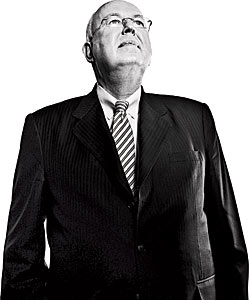Interview conducted and condensed by Jeff Bailey

Few groups are held in lower regard than our legislators in Springfield. But under a proposal you floated earlier this year, ComEd would have paid the state $500 million cash to help plug its budget hole, made other long-term commitments, and in return would have gotten electricity rate guarantees potentially worth billions. Critics said the deal amounted to bribery, and you abandoned it but were left looking no better than the elected gang in Springfield. What were you thinking?
There is no way you can keep a company like ours out of politics. We live in Springfield every day. The real issue for us is trying to be a cooperative party in solving problems. We aren’t sitting here writhing in pain because this proposal didn’t walk.
Whose idea was it, anyway?
Who made a move first—when you have a girl and a sailor—it’s hard to say.
Exelon quit the U.S. Chamber of Commerce over its Luddite position on global warming.
“Luddite” was your word, but you don’t see me rising in righteous indignation.
Of course, as the biggest U.S. operator of nukes, which don’t produce greenhouse gases, you enjoy a competitive advantage from efforts to reduce carbon dioxide emissions. Would you be such an environmental rabble-rouser if you were instead Mr. Coal?
Probably not. But if I was Mr. Coal, would I have worked on climate change [policy]? The answer is yes. In 1992 I proposed a carbon tax while running New England Electric, a coal utility.
ComEd’s nuclear plants weren’t running so reliably when you arrived in 1998, and customers were still paying for huge construction costs. But you got the nukes humming nicely, and then global warming came along, and now nukes are sexy again. Half brilliance and half luck?
Oliver Kingsley [Exelon’s former number two] and others deserve the credit for the nuclear turnaround. Kingsley bred a whole new level of discipline in the operation. Accountability. Paying more—but getting more. Very much a cultural turnaround. In a sense, climate change coming along is luck, though we’ve yet to make any money on it.
You’re spending to add slightly to the output of your nukes—1,500 megawatts in all—in effect adding a nice-size power plant without building one and avoiding all sorts of up-front risks. Is this new technology, or could we have done this sooner?
You always could have done it sooner. But we’ve already done 1,100 megawatts of it. We think on the whole [the upgraded plants] cost one-half the price of a new nuclear plant.
You and your wife have given money to endow five academic chairs: two in history at your alma mater, the University of Wisconsin; one in sustainable energy and architecture at the Illinois Institute of Technology, where you’re chairman; and one in evolutionary biology at the Field Museum. Endowed chairs are old-style philanthropy. What gives?
I grew up on a farm in southwest Wisconsin. I went to a one-room country school for eight years. I went to the University of Wisconsin and had a lot of mind-opening experiences. The University of Wisconsin gave me the opportunity to leave the farm.
You’re 65. When will you step aside and let someone younger have a shot?
I was planning to leave next year. My board asked me to stay till the end of 2012. They want a little more time with the people who might succeed me. But there’s no doubt that by the end of 2012, it’s time.
Photograph: Bob Stefko


